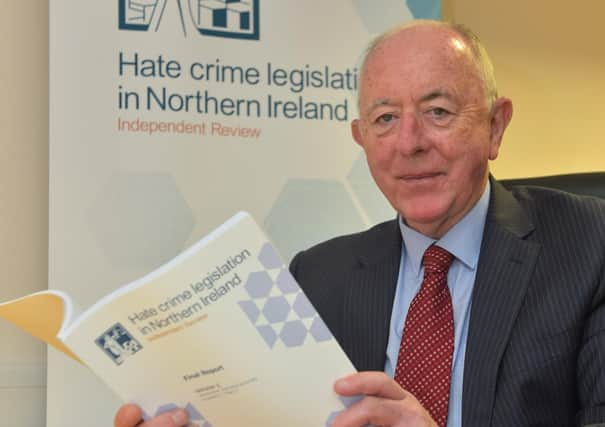Hate crime judge recommends abolishing free speech protections in private dwellings on issues such as race, sexual orientation, transgenderism and religion


Judge Des Marrinan has instead recommended a new protection to keep ‘private conversations’ out of the remit of the PSNI on such subjects.
Mr Marrinan argued that it was essential to abolish the ‘private dwelling’ defence because people had been using it to avoid prosecutions for publishing hate speech online from their own homes.
Advertisement
Hide AdAdvertisement
Hide AdHe accepted that the Malicious Communications Act – used to prosecute Pastor Jim McConnell for criticising Islam in 2015 – would instead allow prosecution of “grossly offensive” speech without having to abolish the ‘private dwelling’ defence.
But this was not an acceptable alternative, he said, because that legislation was “potentially unfair” in light of the fact its legal terms are so subjective.
Current protections may stop the PSNI investigating private conversations in an individual’s home even if they have “demonstrated hostility against other people’’ he said.
But asked how he would define a “private conversation” in order to protect it when such protections are gone, he said this was “not easy”.
Advertisement
Hide AdAdvertisement
Hide Ad“I have said in my report this is one area where I have not been able to finally give a definition of a private conversation. Clearly it should include your own family sitting around your own family table. That is absolutely crystal clear.” But he suggested comments made from home on private internet chat rooms should not be protected.
He acknowledged that critics in England have been very concerned about similar recommendations there. ”Well I have read those concerns and I am afraid I genuinely find some of them to be rather alarmist,” he said.
The News Letter put it to him that such legislation could break new ground by making it PSNI business what people say in their own homes on matters that have not been subject to criminal law before now.
He responded that this was “certainly not the intention of what I am proposing” but accepted this was no guarantee such a law would not be abused.
Advertisement
Hide AdAdvertisement
Hide AdHis solution is that MLAs and the justice minister will have at least two years to hammer out safe protections.
He said it was possible to draft legislation which would purely focus on policing online hate speech without amending the private dwelling defence.
However electronic communications is a reserved matter, he said, meaning it can only be legislated for at Westminster. And Westminster has been processing a social media bill for several years with little sign of progress.
Therefore it made more sense for NI to legislate its own alternative solution on a much quicker basis, he said.
Advertisement
Hide AdAdvertisement
Hide AdMeanwhile, major concerns on freedom of speech and privacy have been raised in England and Scotland about plans for new hate crime legislation which mirrors that now proposed for Northern Ireland.
The Scottish Police Federation general secretary Calum Steele expressed concern about the hate crime bill currently making its way through the Scottish Parliament.
“Police are all too aware that there are individuals in society who believe that to feel insulted or offended is a police matter,” he said. “The bill would move even further from policing and criminalising of deeds and acts to the potential policing of what people think or feel, as well as the criminalisation of what is said in private.”
The Law Society of Scotland warned that the bill “presents a significant threat to freedom of expression, with the potential for what may be abusive or insulting to become criminalised”.
Advertisement
Hide AdAdvertisement
Hide AdFree speech organisations in England have also warned that proposals to prosecute individuals for hate crimes based on what they may discuss in their own homes need to be more widely debated.
Sarah Phillimore, a barrister and member of the Fair Cop free speech organisation, said proposals from the English Law Commission would encourage “state surveillance or people to inform on their friends. How else would they get the evidence? It will be like the East German Stasi security service”.
The Index on Censorship also raised concerns. CEO and ex-Labour MP Ruth Smeeth said: “We need to have a proper national debate if we are going to start putting restrictions on language like this.”
The English Law Commission said the current law on incitement of racial and other forms of hatred is “inconsistent and poorly targeted” and its proposals aim to “clarify and improve” the laws. It welcomes feedback on improving the proposals, it added.
Advertisement
Hide AdAdvertisement
Hide AdA message from the Editor:
Thank you for reading this story on our website. While I have your attention, I also have an important request to make of you.
With the coronavirus lockdown having a major impact on many of our advertisers - and consequently the revenue we receive - we are more reliant than ever on you taking out a digital subscription.
Subscribe to newsletter.co.uk and enjoy unlimited access to the best Northern Ireland and UK news and information online and on our app. With a digital subscription, you can read more than 5 articles, see fewer ads, enjoy faster load times, and get access to exclusive newsletters and content. Visit https://www.newsletter.co.uk/subscriptions now to sign up.
Advertisement
Hide AdAdvertisement
Hide AdOur journalism costs money and we rely on advertising, print and digital revenues to help to support them. By supporting us, we are able to support you in providing trusted, fact-checked content for this website.
Alistair Bushe
Editor